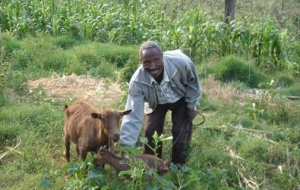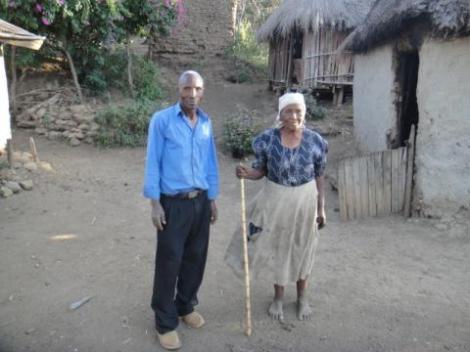By Lauren Rosenbaum and Julia Kurnia
Most people in Mugaa village call David Kamau “Baba Joshua” or “Wajoshua,” because in Kenya parents are known by the name of their first born child. Wajoshua has nine children, a number only slightly above average for a Kenyan family. As his parents’ oldest living son, he is responsible for taking on the family’s burdens, including caring for his parents as they grow old and raising his orphaned niece and nephew. He used to travel to his father’s house by foot, but when the old man’s health deteriorated Wajoshua moved his own house, carrying the roofing sheets and sticks that it had been made of to relocate his dwelling next to that of his parents.
In this area people live for a very long time, perhaps because they walk for miles and miles on hilly terrain daily and eat plenty of vegetables that they grow in their gardens. Wajoshua is 70, but he still seems as hardy and robust as a man in his thirties. His father died recently at the age of 118!
David Kamau with his mother in early 2012
Wajoshua is employed as a gardener at the village school in Mugaa, Kenya. He works hard to make sure that the school is running smoothly, which often requires heavy manual labor. The other day he was personally fixing one of the many atrocious roads that leads to the school, throwing heavy rocks out of the path and carrying bags of sand and gravel to replace them. I am continually amazed by how much energy he has to do these things.
I have been invited to Wajoshua’s house a number of times. The first time he showed me his goats and explained to me all of the measures he takes to care for them. He told me that the goats are better quality than typical African goats because they are able to produce milk and thus generate income without being used for meat. In order to obtain such animals, Wajoshua organized with a group of farmers to collectively breed the goats, rotating males and females among the group to avoid inbreeding. Wajoshua started with just one baby female, and then added a full-grown male and another baby male as well. To keep them healthy, he must pay for their food, salts, and medicine. He also feeds them fresh vegetables, like the kale he grows in his garden. Because the baby goat gets cold at night, Wajoshua brings him inside the house to sleep.
Wajoshua is a very social person and doesn’t think much of walking seven kilometers to see a friend. He also likes to invite people over to watch his television, which he powers with a solar battery – a common contraption in remote areas that do not have access to electricity. When I come to his house he always makes me mahindi choma (salty roasted maize), which is sort of like popcorn for Kenyan families. His kids watch the television with us, an exercise Wajoshua says helps them improve their English. After I leave they begin studying, using lamps powered by the solar battery. As the family values education, many of the children are at the top of their classes.
Wajoshua used his first Zidisha loan of $260 to purchase four more dairy goats, which he reared and one of them gave birth. He later sold them (save for the kid) and used the proceeds to buy a cow, whose milk is a source of daily cash for Wajoshua’s family. The cow recently gave birth and he now owns a calf.
With his second Zidisha loan of $469, Wajoshua bought a supply of maize and beans at harvest to resale during the lean season – improving food security and farmers’ incomes in Mugaa, while generating a net profit of $375. He used that profit to purchase another heifer as an additional source of milk and income for his family.
Wajoshua invested his current loan of $943 in a larger supply of locally harvested beans. He built a granary at his home to store the beans, and purchased a donkey to transport them from the farmers. From there, he is selling the beans to to wholesalers from a nearby town. He estimates that the $943 worth of beans will generate sales revenue of $1250, which he intends to use to purchase a stock of maize in time for that crop’s harvest season.
“The previous loans that have acquired from Zidisha have not only helped in improving our status as a family but have made my family an admiration in the society,” Wajoshua wrote. “Kudos to Zidisha team… Am very optimistic that all shall go well. Lucky me that Zidisha is my financial partner.”
You may read more in David Kamau’s loan profile page.




